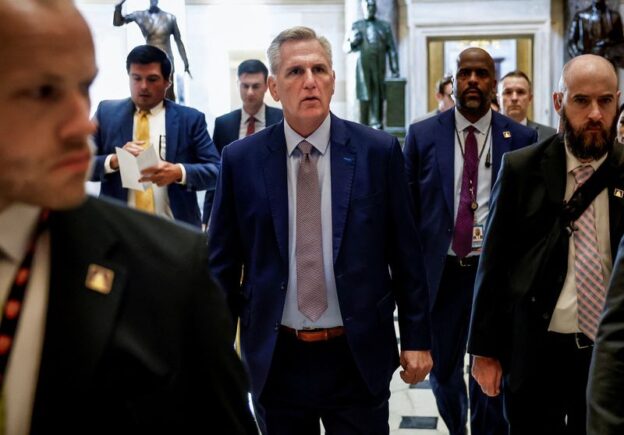2/2
© Reuters. U.S. House Speaker Kevin McCarthy (R-CA) speaks with reporters as he walks to the House floor at the U.S. Capitol in Washington, U.S., September src9, 2023. REUTERS/Evelyn Hockstein
2/2
By David Morgan and Moira Warburton
WASHINGTON (Reuters) -Republicans who control the U.S. House of Representatives failed to advance two spending bills on Tuesday, as party infighting threatened the ability of Congress to fund the government and avert a partial shutdown at the end of the month.
The House voted 2src4-2src2 to defeat a measure that would have opened debate on an $886 billion fiscal 2024 defense appropriations bill, with five hardline Republican conservatives joining Democrats to oppose their party’s own measure.
Meanwhile, a larger division within House Speaker Kevin McCarthy’s fractious Republican majority prevented lawmakers from agreeing on a short-term measure to keep federal agencies afloat after funding expires on Sept. 30.
McCarthy has been unable to win cooperation from hardliners who want assurances that fiscal 2024 appropriations will not exceed a 2022 top line of $src.47 trillion – $src20 billion less than McCarthy and Democratic President Joe Biden agreed to in May.
Political brinkmanship has begun to attract the attention of Wall Street, with rating agency Fitch citing repeated down-to-the-wire negotiations that threaten the government’s ability to pay its bills when it downgraded U.S. debt rating to AA+ from its top-notch AAA designation earlier this year.
Republican Representative Tom Cole, chair of the House Rules Committee, expressed frustration with the small minority of his party who voted against the measure, known as a rule.
“There’s nothing in there that anybody has a problem with, they’re just working out whatever their issues are on this bill and on this rule and I just think that’s very unfortunate,” Cole said.
The House and the Democratic-led Senate have less than two weeks to avoid a shutdown by passing either short-term or long-term funding measures.
Even if House Republicans had been able to advance the defense bill or the short-term measure, either would face stiff opposition from congressional Democrats and from the White House, which has already threatened to veto the defense bill.
RAUCOUS SESSION
Tuesday’s House vote failed in a raucous session, with Democrats mocking Republican leaders as they tried to persuade holdouts to change their minds before finally giving up.
“You think it’s fun for me to vote against the rule?” one holdout, Republican Representative Ralph Norman, said as his colleagues complained that such votes weakened Republicans. “But I’m also unwilling to continue as we’ve done and have unlimited spending.”
The House vote came hours after McCarthy delayed a key procedural vote on the 30-day stopgap measure known as a continuing resolution, or CR. The California Republican said he wanted to give lawmakers enough time to reach agreement on the legislation.
The continuing resolution faces opposition from more than a dozen Republican hardline conservatives, enough to block its path forward in the House.
The CR would keep federal agencies afloat until Oct. 3src but cut discretionary spending by about 8% for agencies outside of defense, veterans affairs and disaster relief. It would also impose certain restrictions on immigration and resume construction of a wall on the U.S.-Mexico border.
Faced with a looming Sept. 30 deadline, lawmakers have begun to discuss other options for keeping the government funded, with Democratic Senator Patty Murray, who heads that chamber’s appropriations committee, telling reporters that she was working on a bipartisan CR. A bipartisan House group that calls itself the Problem Solvers Caucus is also working on a backup, multiple members of the group told reporters.
“Just gotta keep trying to get to yes, and if we can’t and we’re coming too close to the deadline, then Plan B,” said Republican Representative Brian Fitzpatrick, a Problem Solvers Caucus member. “Plan B is 2src8 in the Congress, not the conference.”

Comments are closed